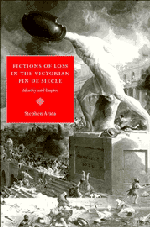Book contents
- Frontmatter
- Contents
- Acknowledgements
- Introduction: Decline and fall
- PART ONE STRANGE CASES, COMMON FATES
- 1 Strange cases, common fates: degeneration and fiction in the Victorian fin de siècle
- 2 The sedulous ape: atavism, professionalism, and Stevenson's Jekyll and Hyde
- 3 Wilde's trials: reading erotics and the erotics of reading
- PART TWO BETWEEN THE BODY AND HISTORY
- PART THREE THE SINS OF EMPIRE
- Conclusion: Modernist empires and the rise of English
- Notes
- Index
1 - Strange cases, common fates: degeneration and fiction in the Victorian fin de siècle
Published online by Cambridge University Press: 10 May 2010
- Frontmatter
- Contents
- Acknowledgements
- Introduction: Decline and fall
- PART ONE STRANGE CASES, COMMON FATES
- 1 Strange cases, common fates: degeneration and fiction in the Victorian fin de siècle
- 2 The sedulous ape: atavism, professionalism, and Stevenson's Jekyll and Hyde
- 3 Wilde's trials: reading erotics and the erotics of reading
- PART TWO BETWEEN THE BODY AND HISTORY
- PART THREE THE SINS OF EMPIRE
- Conclusion: Modernist empires and the rise of English
- Notes
- Index
Summary
HOOLIGANS AND FLESHLY POETS
To begin, consider two essays written by the Scottish literary journalist Robert Buchanan. Both invoke degeneration in order to condemn a popular author, though the authors condemned could hardly be less alike. In December 1899 Buchanan attacked Rudyard Kipling in “The Voice of the Hooligan,” inaugurating a by now familiar line of Kipling criticism. “The Voice of the Hooligan” linked Kipling's literary ascendancy with the rise of militant jingoism and lamented the barbarizing effects of both on British culture. Kipling's “exaltation to a position of almost unexampled popularity,” Buchanan argued, could be accounted for only by the fact that “in his single person [he] adumbrates…all that is most deplorable, all that is most retrograde and savage, in the restless and uninstructed Hooliganism of the time.” Late-Victorian fears of the “hooligan” drew heavily on middle-class portrayals of the urban poor as a degenerate race whose physical and psychological health had been irreparably damaged by modern city life. Buchanan extends this category to include those portions of the bourgeoisie whose appetites had likewise been brutalized by contemporary conditions. For Buchanan, the hooligan was the type of the modern degenerate, Kipling its most dangerous spokesman. His fiction pandered to “whatever is basest and most brutal” in modern man, quickening the decline of a once-great English people.
Buchanan, when he is remembered, is sometimes remembered for this essay, though his name is more often linked with a piece published twentyeight years previous to it.
- Type
- Chapter
- Information
- Fictions of Loss in the Victorian Fin de SiècleIdentity and Empire, pp. 11 - 32Publisher: Cambridge University PressPrint publication year: 1996



